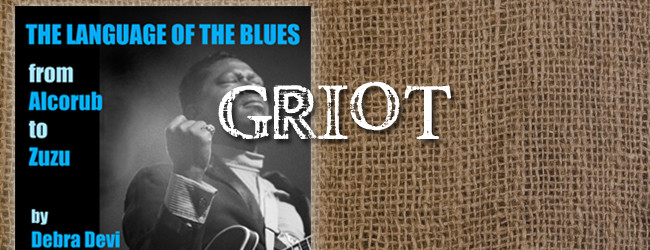This is the latest installment of our weekly series, The Language of the Blues, in which author/rocker Debra Devi explores the meaning of a word or phrase found in the blues. To learn lots more about what your favorite blues songs really mean, grab a signed copy of Devi’s award-winning book The Language of the Blues: From Alcorub to ZuZu (Foreword by Dr. John) at Bluescentric.com. “One of the wittiest, bawdiest, most fascinating dictionaries ever.” (Reuters)
 In West Africa, a griot is a singer-historian who keeps the oral histories of families, tribes, and dynasties alive in song. Griots serve the same purpose as the bards and skalds of medieval European courts once did. Griots keep and also comment upon the history of the court. As Alan Lomax explained in The Land Where the Blues Began, “They [griots] are social satirists, whose verses once on a time dethroned chieftains.”
In West Africa, a griot is a singer-historian who keeps the oral histories of families, tribes, and dynasties alive in song. Griots serve the same purpose as the bards and skalds of medieval European courts once did. Griots keep and also comment upon the history of the court. As Alan Lomax explained in The Land Where the Blues Began, “They [griots] are social satirists, whose verses once on a time dethroned chieftains.”
What’s interesting about griots with regard to the blues is that, unlike most West African musicians, they accompany themselves and usually sing alone. Most West African music is performed by groups, and is dominated by drumming and dancing. The griot, in contrast, plays a stringed instrument, such as the kora, and sings while others sit and listen attentively. Lomax suggested in The Land Where the Blues Began that “through the work of performers like Sid Hemphill, Blind Lemon Jefferson, Charlie Patton, and their like, the griot tradition has survived full-blown in America with hardly an interruption.”
In Savannah Syncopators: African Retentions in the Blues, Paul Oliver added: “There seem to be many interesting parallels between the attitudes of these savannah communities to the griot and those of the black community to the blues singer…Blues singers are not necessarily socially acceptable in the black community, but they are certainly known to most members of it. They, too, are the sources of humor and entertainment, of gossip and comment, and a singer like Lightnin’ Hopkins is very much a griot in personality, with a similar flair for spontaneous and devastating comment on the passing scene.”
The word griot comes from the French guiriot, which is probably derived from the Portuguese criado or servant. Criado comes from the Latin creatus, meaning one brought up or trained. Griots are brought up in the griot tradition by their fathers and uncles and are trained over many years in order to learn the enormous quantity of traditional songs.
Like certain blues musicians, griots have also been suspected of familiarity with the devil, hence the tradition of interring them standing upright in a hollow tree, rather than burying them in the earth and risking its desecration. Some of this may have to do with the griots’ seemingly magical knowledge of everything that has happened to the people for whom they are singing.
Pick up a copy of Language of the Blues
Video:
Modern-Day Griot Explains the Tradition
Mandingo Ensemble – Night of the Griots


